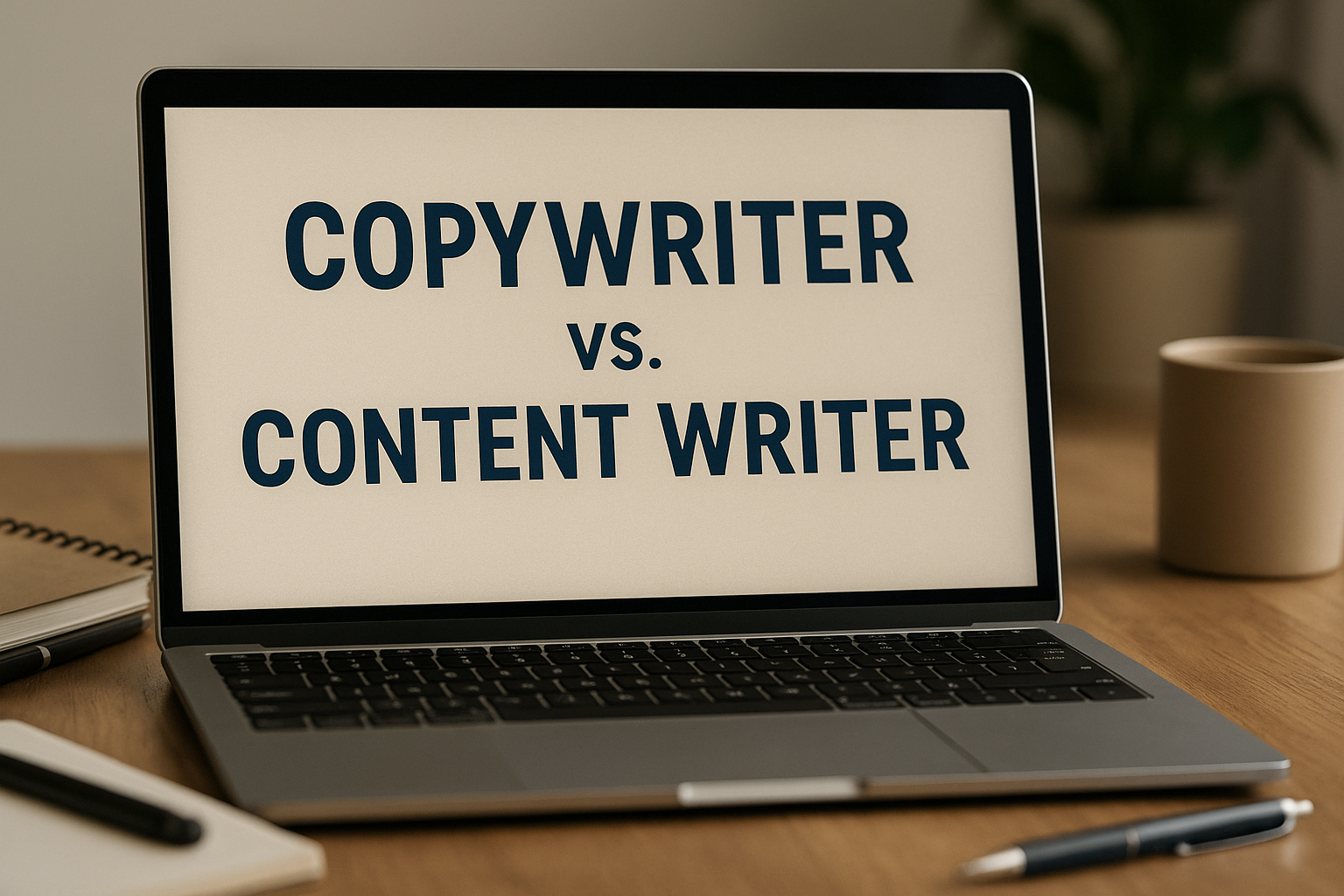If you’re exploring a career in writing, you’ve likely come across two popular roles: copywriter and content writer. While both involve crafting written material, the purpose, style, and strategies behind these roles are quite distinct.
Understanding the differences between the two — and figuring out which suits your strengths — can help you choose a rewarding and sustainable writing path.
What Is a Content Writer?
A content writer focuses on delivering valuable, informative, and engaging content to educate or inform an audience. This type of writing typically aims to build trust, improve SEO, and establish authority over time.
Common types of content writing:
- Blog posts
- Articles
- How-to guides
- E-books
- Case studies
- Pillar pages
- Newsletters
The goal is not necessarily to sell something, but rather to provide knowledge and value that keeps readers coming back.
Skills needed:
- Research and analysis
- Clear, structured writing
- Understanding of SEO
- Ability to simplify complex topics
- Strong grammar and editing skills
What Is a Copywriter?
A copywriter, on the other hand, writes persuasive and strategic content designed to drive action. This could mean getting someone to click, subscribe, buy, or contact a business. Copywriting is closely tied to marketing and sales.
Common types of copywriting:
- Product descriptions
- Sales pages
- Landing pages
- Advertisements (online or print)
- Email sequences
- Social media ads
- Website banners
The goal is to convert — whether it’s generating leads, increasing sales, or boosting engagement.
Skills needed:
- Persuasive writing techniques
- Understanding buyer psychology
- Mastery of call-to-action strategies
- Branding and tone adaptability
- Emotional and benefit-driven storytelling
Copywriting vs. Content Writing: Key Differences
| Aspect | Content Writer | Copywriter |
|---|---|---|
| Purpose | Inform, educate, entertain | Persuade, sell, convert |
| Tone | Informational, helpful | Direct, emotional, urgent |
| Length | Often long-form (700–2000+ words) | Often shorter and punchier |
| Focus | SEO, value delivery | ROI, action, conversion |
| Examples | Blogs, guides, eBooks | Ads, emails, landing pages |
While the boundaries sometimes blur, especially in digital marketing, the core intent remains distinct.
Can You Be Both?
Absolutely. Many successful freelance writers offer both services. In fact, combining content writing and copywriting skills can make you more marketable and increase your income potential.
Some clients want long-form blog content that ends with a persuasive pitch or email copy that educates before selling. Blending both styles is not only possible — it’s often highly valuable.
Which One Should You Choose?
Here’s a quick breakdown based on your strengths and preferences:
Content Writing Might Be Right for You If:
- You enjoy teaching and explaining ideas.
- You’re naturally curious and like research.
- You prefer a slower, informative tone.
- You’re patient with long-term strategies like SEO.
Copywriting Might Be Right for You If:
- You’re persuasive and love marketing.
- You like short-form, high-impact writing.
- You’re driven by results and performance metrics.
- You enjoy experimenting with emotional triggers.
Bonus: Try Both!
If you’re unsure, test both by creating sample pieces. Write a blog post and a landing page. Analyze which one feels more natural, fun, and effective for you.
What Clients Expect from Each Role
Understanding client expectations is crucial. If a client hires you as a content writer, they’ll likely expect:
- In-depth research
- SEO optimization
- Clear, engaging explanations
- Long-form articles
If they hire you as a copywriter, they’ll expect:
- Strong hooks and CTAs
- Sales-focused language
- Understanding of customer journey
- Conversion-oriented content
Clear communication about what you offer and your writing strengths helps manage client expectations and avoid misunderstandings.
How to Price Your Work
Copywriting often commands higher rates because it directly affects sales and business outcomes. Content writing, while essential, usually follows more standardized pricing.
However, both can be highly lucrative depending on your niche, experience, and skill level.
Typical Pricing Ranges (varies by region and experience):
- Content Writing: $0.05–$0.20 per word
- Copywriting: $0.10–$1.00+ per word, or flat project rates
As you gain experience and results, raise your rates accordingly.
Final Thoughts: Choose Based on Passion and Purpose
Both copywriting and content writing are valuable, fulfilling career paths. Rather than forcing a choice, let your interests guide you. The best writers are those who understand the psychology behind words and use them to connect, inspire, and move audiences — no matter the label.
If you can combine the power of content and copy, you’ll become a writing powerhouse clients love to work
